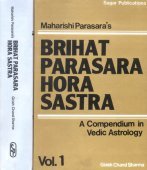Lot, Loṭ: 10 definitions
Introduction:
Lot means something in Hinduism, Sanskrit. If you want to know the exact meaning, history, etymology or English translation of this term then check out the descriptions on this page. Add your comment or reference to a book if you want to contribute to this summary article.
Images (photo gallery)
(+3 more images available)
In Hinduism
Vyakarana (Sanskrit grammar)
Source: Wikisource: A dictionary of Sanskrit grammarLoṭ (लोट्).—A term for the affixes of the imperative mood or आज्ञार्थ (ājñārtha), applied to roots in the same sense in which the 'lin' affixes are applied; cf.विधि-निमन्त्रणामन्त्रणाधीष्टसंप्रश्र्नप्रार्थनेषु लिङ् । लोट् च (vidhi-nimantraṇāmantraṇādhīṣṭasaṃpraśrnaprārthaneṣu liṅ | loṭ ca) P. III.3.161, 162. These affixes, specifically the affixes of the second person singular and plural, are also applied in the sense of frequency or collection,to a root when that root is repeated to show that frequency; e.g. लुनीहि लुनीहि इति लुनाति (lunīhi lunīhi iti lunāti); भ्राष्ट्रमट मठमट खदूरमट इति अटति (bhrāṣṭramaṭa maṭhamaṭa khadūramaṭa iti aṭati); cf. Kāś on P. III. 4. 2,3.

Vyakarana (व्याकरण, vyākaraṇa) refers to Sanskrit grammar and represents one of the six additional sciences (vedanga) to be studied along with the Vedas. Vyakarana concerns itself with the rules of Sanskrit grammar and linguistic analysis in order to establish the correct context of words and sentences.
Languages of India and abroad
Sanskrit dictionary
Source: DDSA: The practical Sanskrit-English dictionaryLoṭ (लोट्).—1 P. (loṭati) To be mad or foolish; see लोड् (loḍ).
--- OR ---
Loṭ (लोट्).—A technical term used by Pāṇini to denote the Imperative Mood or its terminations.
Source: Cologne Digital Sanskrit Dictionaries: Shabda-Sagara Sanskrit-English DictionaryLoṭ (लोट्).—[(ṛ) loṭṛ] r. 1st cl. (loṭati) To be mad or foolish.
Source: Cologne Digital Sanskrit Dictionaries: Benfey Sanskrit-English DictionaryLoṭ (लोट्).—see loḍ.
Source: Cologne Digital Sanskrit Dictionaries: Cappeller Sanskrit-English DictionaryLoṭ (लोट्).—[substantive] the imperative & its endings ([grammar]).
Source: Cologne Digital Sanskrit Dictionaries: Monier-Williams Sanskrit-English Dictionary1) Loṭ (लोट्):—1. loṭ (or loḍ) [class] 1. [Parasmaipada] loṭati or loḍati, to be mad or foolish, [Dhātupāṭha ix, 74.]
2) 2. loṭ (in gram.) Name of the terminations of the Imperative and Name of that Mood itself.
Source: Cologne Digital Sanskrit Dictionaries: Yates Sanskrit-English DictionaryLoṭ (लोट्):—(ṛ) loṭati 1. a. To be made.
[Sanskrit to German]
Sanskrit, also spelled संस्कृतम् (saṃskṛtam), is an ancient language of India commonly seen as the grandmother of the Indo-European language family (even English!). Closely allied with Prakrit and Pali, Sanskrit is more exhaustive in both grammar and terms and has the most extensive collection of literature in the world, greatly surpassing its sister-languages Greek and Latin.
Nepali dictionary
Source: unoes: Nepali-English DictionaryLot is another spelling for लोट [loṭa].—n. paper note; note; rupee;
Nepali is the primary language of the Nepalese people counting almost 20 million native speakers. The country of Nepal is situated in the Himalaya mountain range to the north of India.
See also (Relevant definitions)
Starts with (+87): Lokatantra, Lota, Lota bans, Lota chali, Lota dhekia, Lota phutkola, Lota-lotaenal, Lotabadagi, Lotabans, Lotagada, Lotage, Lotagu, Lotaguttu, Lotai, Lotaipotai, Lotak, Lotaka, Lotakalu, Lotake, Lotaku.
Ends with (+21): Annual melilot, Bhatia-lot, Bois matelot, Common melilot, Common yellow melilot, Corn melilot, Garden shallot, Gilar lot, Guhilot, Hallot, Halot, Hogunilot, Indian melilot, Kapanatulot, Kapanitulot, Khan thalot, Khan tua lot, King island melilot, Kuwalot, Kwalot.
Full-text (+857): Gutikapata, Lod, Dharmadharmapariksha, Laud, Thikevara, Grahadasha, Chakadicem Mapa, Kusapata, Preshani, Prata, Atam, Bhaddaghata, Pilipotu, Cittukkulukku, Mamyadala, Atyadhika, Jayaggaha, Khuba, Botala, Bhagadheya.
Relevant text
Search found 353 books and stories containing Lot, Loṭ; (plurals include: Lots, Loṭs). You can also click to the full overview containing English textual excerpts. Below are direct links for the most relevant articles:
Heimskringla (by Snorri Sturlson)
Part 4 - Of Harald And Gyrger Casting Lots < [Chapter IX - Saga Of Harald Hardrade]
Part 193 - Of Jokul Bardson < [Chapter VII - Saga Of Olaf Haraldson]
Part 16 - Of The Threats Of The Bondes < [Chapter VIII - Saga Of Magnus The Good]
Vakyapadiya of Bhartrihari (by K. A. Subramania Iyer)
Verse 3.7.126 < [Book 3 - Pada-kāṇḍa (7): Sādhana-samuddeśa (On the Means)]
Verse 2.253 < [Book 2 - Vākya-kāṇḍa]
Vasudevavijaya of Vasudeva (Study) (by Sajitha. A)
Sugalārthamālā of Peruntānam Nārāyaṇan Nampūtiri < [Chapter 1 - Śāstrakāvyas—A Brief Survey]
Lakāra-artha < [Chapter 3 - Vāsudevavijaya—A Grammatical Study]
Ātmanepada (in Sanskrit grammar) < [Chapter 3 - Vāsudevavijaya—A Grammatical Study]
Contribution of Vachaspati-Mishra to Samkhya System (by Sasikumar. B)
Jain Science and Spirituality (by Medhavi Jain)
4.4. Yoga and The Awakening of Cakras < [Chapter 4 - Main Theory and Practices in Jainism]
2.3. Physical Bodies and Psychical Bodies < [Chapter 6 - Spirituality in Jainism]
3.4. Attaining Right Knowledge < [Chapter 4 - Main Theory and Practices in Jainism]
The Great Chronicle of Buddhas (by Ven. Mingun Sayadaw)
Biography (22): Kuṇḍa Dhāna Mahāthera < [Chapter 43 - Forty-one Arahat-Mahatheras and their Respective Etadagga titles]
Chapter 27a - An Account of Rich Man Ghosaka of Kosambī Country < [Volume 3]
Cūḷaseṭṭhi Jātaka < [Chapter 43 - Forty-one Arahat-Mahatheras and their Respective Etadagga titles]
Related products









